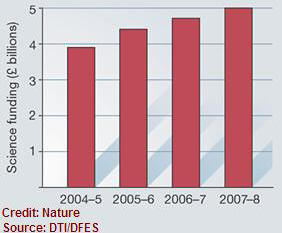 British
Government Places Big Bet on Science and Technology to Make Nation More
Competitive. (July 14, 2004)
British
Government Places Big Bet on Science and Technology to Make Nation More
Competitive. (July 14, 2004)
|
News & Views item - July 2004 |
![]()

Britain's Chancellor of the Exchequer Gordon Brown has pledged an additional £1 billion (A$2.5 billion) for Science by 2007-08. He plans to push R&D spending to a level that would put the United Kingdom on a par with its major European rivals and not far behind the United States. Details of the Chancellor's 2004 Spending Review with regard to the 2004 - 2014 Science and Innovation Investment Framework were published on July 12.
In addition as part of a ten-year science strategy, there are to be a number of smaller measures including an extra £80 million over three years to help fund salaries associated with basic research grants, in response to complaints that these costs were being ignored by funders.
In the triennium "Spending Review" Brown said he would fire more than 100,000 civil servants to help pay for his reforms. Nevertheless at a time when he proposes to keep a tight lid on many areas of government spending Robert May, president of the Royal Society said, "science does better than just about anywhere."
According to Science, "The spending plans for science--amounting to an increase of 5.8% per year above inflation for 3 years--do not specify particular programs or facilities that might get the money, but instead seek to strengthen the whole research system. A large part of the government's new spending is devoted to technology transfer into industry, where R&D spending lags behind Britain's competitors." If funding continues to rise at 5.8% over the next decade, the level of basic research grants may double but there is no specific commitment by Brown to that effect.
Peter Cotgreave, director of Save British Science, while welcoming the Chancellor's initiative to overhaul research grants which currently do not cover the full cost of conducting the research to cover overheads, would like to see the ramp up accelerated so, "we could get there sooner," to allow for "offbeat ideas that are not yet ready for a grant" to be resourced through liberated university funds. Cotgreave also worries that the plan Brown has devised has done nothing to improve university researchers salaries. Accordingly Britain's best scientists are often lured overseas, "the government has not addressed the problem of retention."
And Nature reports that "Critics question whether the
strategy contains the new ideas needed to achieve this goal. Science-policy
experts say that reaching the 2.5% target depends on increased private-sector
funding. America's top 700 companies reinvest around 5% of money from sales into
research and development, for example, but UK companies spend only half of that.
"Yet the strategy focuses instead on boosting existing
measures, such as grants to help universities work with industry. 'There are no
new fiscal measures and that is disappointing' says Cotgreave."
It remains to be seen what changes will be made to the Brown's "New Public Spending Plan" when it is presented to Parliament.
[See also:
The
Group of Eight Releases a Comparison of Australian and OECD Expenditure on R&D.]